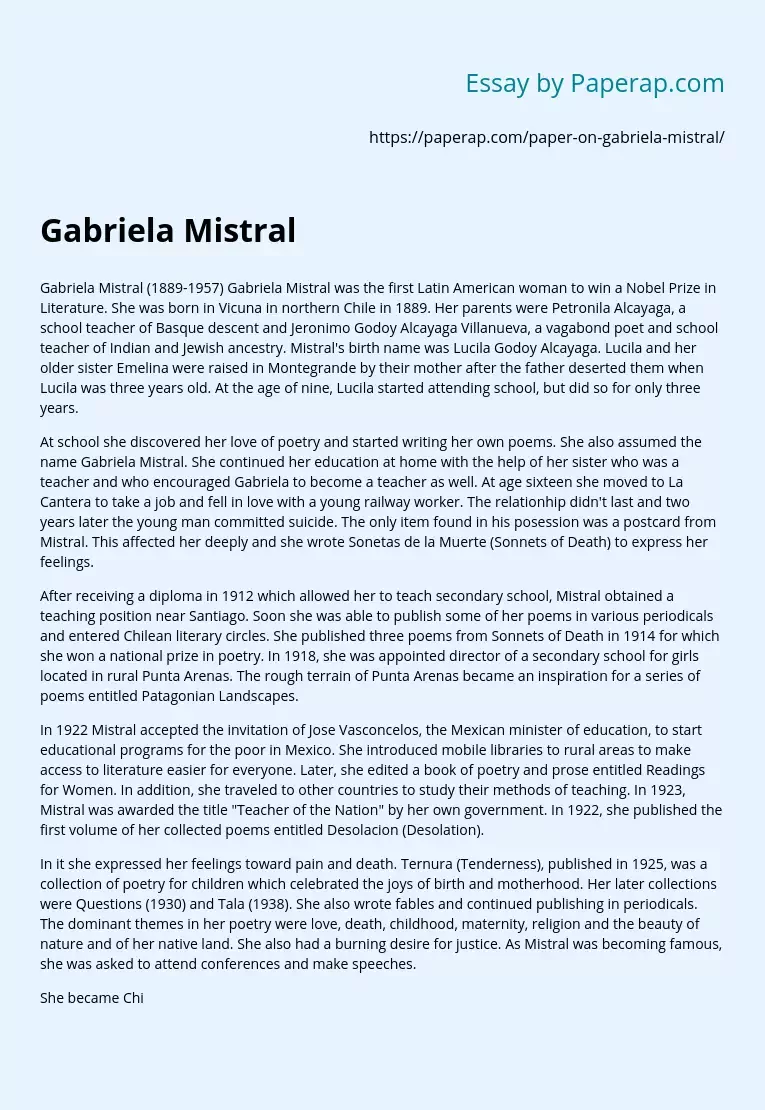Gabriela Mistral
Gabriela Mistral (1889-1957) Gabriela Mistral was the first Latin American woman to win a Nobel Prize in Literature. She was born in Vicuna in northern Chile in 1889. Her parents were Petronila Alcayaga, a school teacher of Basque descent and Jeronimo Godoy Alcayaga Villanueva, a vagabond poet and school teacher of Indian and Jewish ancestry. Mistral’s birth name was Lucila Godoy Alcayaga. Lucila and her older sister Emelina were raised in Montegrande by their mother after the father deserted them when Lucila was three years old.
At the age of nine, Lucila started attending school, but did so for only three years.
At school she discovered her love of poetry and started writing her own poems. She also assumed the name Gabriela Mistral. She continued her education at home with the help of her sister who was a teacher and who encouraged Gabriela to become a teacher as well. At age sixteen she moved to La Cantera to take a job and fell in love with a young railway worker.
The relationhip didn’t last and two years later the young man committed suicide. The only item found in his posession was a postcard from Mistral. This affected her deeply and she wrote Sonetas de la Muerte (Sonnets of Death) to express her feelings.
After receiving a diploma in 1912 which allowed her to teach secondary school, Mistral obtained a teaching position near Santiago. Soon she was able to publish some of her poems in various periodicals and entered Chilean literary circles.
She published three poems from Sonnets of Death in 1914 for which she won a national prize in poetry. In 1918, she was appointed director of a secondary school for girls located in rural Punta Arenas. The rough terrain of Punta Arenas became an inspiration for a series of poems entitled Patagonian Landscapes.
In 1922 Mistral accepted the invitation of Jose Vasconcelos, the Mexican minister of education, to start educational programs for the poor in Mexico. She introduced mobile libraries to rural areas to make access to literature easier for everyone. Later, she edited a book of poetry and prose entitled Readings for Women. In addition, she traveled to other countries to study their methods of teaching. In 1923, Mistral was awarded the title “Teacher of the Nation” by her own government. In 1922, she published the first volume of her collected poems entitled Desolacion (Desolation).
In it she expressed her feelings toward pain and death. Ternura (Tenderness), published in 1925, was a collection of poetry for children which celebrated the joys of birth and motherhood. Her later collections were Questions (1930) and Tala (1938). She also wrote fables and continued publishing in periodicals. The dominant themes in her poetry were love, death, childhood, maternity, religion and the beauty of nature and of her native land. She also had a burning desire for justice. As Mistral was becoming famous, she was asked to attend conferences and make speeches.
She became Chile’s representative abroad for almost twenty years, including at the League of Nations, at the United Nations and in various consulates. Evenutally, Mistral settled in the United States and taught at Middlebury and Barnard colleges and at the University of Puerto Rico. In 1945, Gabriela Mistral was awarded the Nobel Prize in Literature. She accepted it on behalf of Latin America. Her poetry has now been translated into other foreign languages, including English, French, Italian, German and Swedish. Gabriela Mistral died in the U. S. in 1957. Her body was flown to Chile and she was buried in Montegrande. [pic]
Gabriela Mistral. (2018, Aug 11). Retrieved from https://paperap.com/paper-on-gabriela-mistral/

